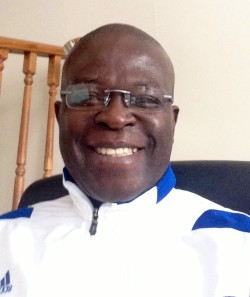Andy Kusi-Appiah is the founder of SkillFocus, an Ottawa-based soccer development program for elite athletes, and has also served as head coach for elite teams in both Ontario and Quebec (1995-2010). He is also the co-founder and CEO of the Canadian Education Management Agency. Andy was the senior advisor on diversity issues to Mayor Bob Chiarelli, and has also served on numerous advisory committees and Task forces at the City of Ottawa. Andy is a professor at Carleton University.
******************************************************************************************************
African teams and the World Cup of 2014: A confirmation?
By Andy Kusi-Appiah
Another World Cup has come and gone, but there were no revelations, just confirmations! This World Cup just confirmed how lacking in organization and planning the African representatives were. In this World Cup, talent was not lacking on any of the African teams. In this World Cup, African teams were brimming with youthful stars as will as players who had honed their skills and talents at the very highest level. In this World Cup, players of African ancestry who played on other national teams confirmed the unthinkable – that organization is everything!
Jerome Boateng’s performance confirmed that organization and preparation can propel anybody to greater heights;
Origi, Lukaku and Pogba confirmed that football is all about preparation and organization and team work and following instructions.
In this World Cup, Costa Rica and the United States confirmed that several years of planning and organization pays off.
As far as the African representatives are concerned, it was confirmed that (apart from Algeria) talent alone does not propel any group of individuals to football greatness, one needs something more than talent, for talent is good but it does not win anything on its own, perseverance and persistence are the ingredients of successful endeavours.
There is no doubt that Africa (yes the whole continent of Africa) is the domain of football talent; it is a place where children are born with proverbial cleats on their feet. But alas, it is instructive to note that the ontological presence of talent in any delimited space does not necessarily bring success, one needs something more than talent to succeed.
African teams in this year’s diadem came with a lot of promise: a promise to go further than the “benchmark” of reaching the quarter finals, but they failed woefully to the utter disappointment of their long suffering fans.
But there is a reason why it happened that way, and it had nothing to do with the talent pool on the continent.
Let us consider the following:
In the 1960s, Portugal was one of the best footballing nations in planet earth, thanks to the footballing exploits of Eusebio of blessed memory. Eusebio was a man of African ancestry, he was originally from Mozambique. Eusebio’s talent was discovered by a Portuguese national who was on vacation in Mozambique. With good organization and preparation, Eusebio led the Portuguese national team to many honours. Today, Eusebio is a national hero in Portugal.
African teams at this year’s World Cup were ill prepared, poorly managed and lacked discipline. Most of the teams were not even able to plan and execute simple logistical resources for their players during the tournament in Brazil. Some teams were stranded for hours before they could check into hotels, to relax for their next games during the tournament. Some teams were saddled with “spur of the moment” changes to previously agreed upon plans. The result was that players were demoralized and very angry. The rest is history, and the lesson is a simple one: until African FAs dedicate themselves to the principles of professionalism and good planning regimen, they will always find themselves in a situation of “also runs”.
I sense a revolution which will eventually lead to an African semi-finalist in Russia 2018.


